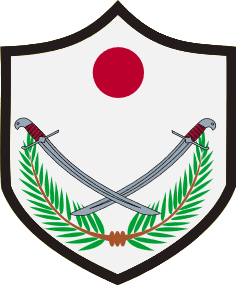Multi-national Force - Insula Fera: Difference between revisions
No edit summary |
(→Legacy) |
||
| Line 70: | Line 70: | ||
=== 2019 withdrawals === | === 2019 withdrawals === | ||
By the end of May, 2019, Aquitayne no longer had any front-line combat units in the country. Troops stationed in country for general security measures were not counted unless they were specifically attached to the MNF-IF. | By the end of May, 2019, Aquitayne no longer had any front-line combat units in the country. Troops stationed in country for general security measures were not counted unless they were specifically attached to the MNF-IF. | ||
== Current composition == | |||
== Legacy == | == Legacy == | ||
Revision as of 12:42, 28 March 2024
| Multi-national Force - Insula Fera | |
|---|---|
 Official logo of MNF-IF | |
| Active | 28 December 2013 – Present |
| Country | New Pangus
Contributing Nations: |
| Role | Counter-insurgency operations Internal stability and defense HUMINT/SIGINT |
| Size | 25,000 (March 2024) |
| Headquarters | Corvus, Pangus |
| Engagements | Greater Insula Feran Conflict |
The Multi-national Force - Insula Fera (MNF-IF), often referred to as the coalition forces, is a military command established during the 2013 invasion of Pangus-codenamed "Operation United Resolve" - that is still operating in the Greater Insula Feran Conflict as the highest command authority in the region. The precarious nature of the coalition's establishment means that the leadership of the command alternates between Aquitaynian and Dangish officers, respectively.
The MNF-IF replaced the UKJMOT (United Kingdom Joint Military Operational Theater) that had initially begun the preparation stages for the invasion into Pangus and Prudensia. The force was significantly reinforced during the Pangus Conflict Troop Surge of 2016.
Today, the New Pangus Defense Forces handle the majority of the security needs in New Pangus. However, Aquitaynian and Dangish troops do remain in the country for training, material, and intelligence support operations. The last airstrikes coordinated directly by Aquitaynian or Dangish forces was in 2017.
Etymology
The news media often referred to the Multi-national Force - Insula Fera as "coalition troops" and "Aquitaynian troops", as the majority of soldiers provided to the organization were Aquitaynian. The majority of soldiers deployed by foreign nations were often used to combat directly the Heraldan rebels, rather than remain stationary within their fortifications. The exception to this is Cadenza's police force that was sent to Pangus to train new police officers during the occupation, who were not permitted to engage in combat operations.
History
List of countries in the coalition
At the beginning of the invasion, the need for a joint coalition command became apparent when East Astyrian Treaty Alliance forces and Aquitaynian forces began what some call a "rush" to secure territory and strategic positions ahead of the other. The MNF-IF was established to help lower tensions in the region and provide clear lines of communication between all parties involved. The founding members of the MNF-IF were Aquitayne, the Dangish Empire, the Blackhelm Confederacy, Symphonia, and Cadenza. Kyashi would join during the latter stages of the invasion.
Troop deployment in Pangus 2013-2017
| Troops at time of MNF-IF deactivation | Withdrawn troops (2014-2016) | Withdrawn troops (2017) |
|---|---|---|
|
Total invasion deployment
|
|
2016 handover
Direct control over the internal security of the country was handed over to the New Pangus Defense Forces on 15 September 2016, in an effort to ensure the nation's ability to defend itself with coalition support. This handover coincided with the drawdown of over 75,000 coalition troops in November of 2016.
2017 withdrawals
Aquitayne, having waited an additional 5 months to ensure the handover was successful, withdrew over 65,000 troops from New Pangus, leaving 46,500 still in country.
2019 withdrawals
By the end of May, 2019, Aquitayne no longer had any front-line combat units in the country. Troops stationed in country for general security measures were not counted unless they were specifically attached to the MNF-IF.
Current composition
Legacy
Today, the MNF-IF still acts as a joint command structure for the NPDF to coordinate operations with their Aquitaynian and Dangish partners, though those nations are solely engaged in support efforts and are no longer engaged in front-line operations, except for training advisors that may be attached to front line units.
References
- ↑ Fifty constables were deployed to Pangus to assist in re-establishing various police departments and police protocols.